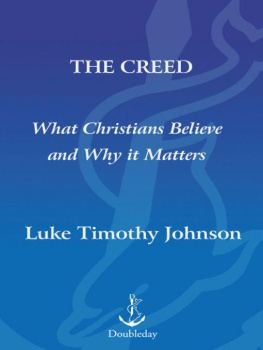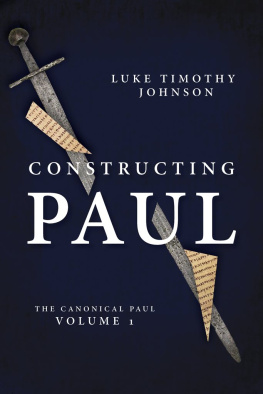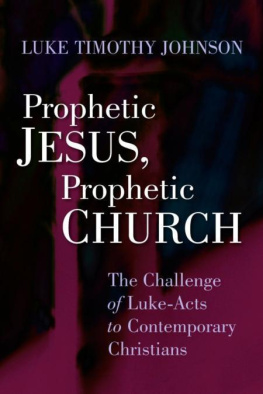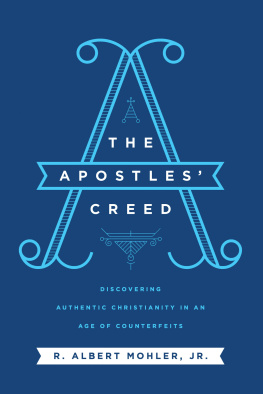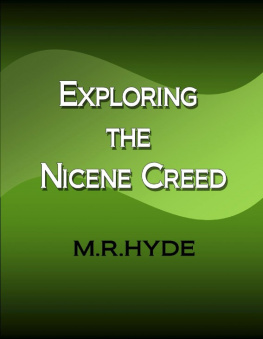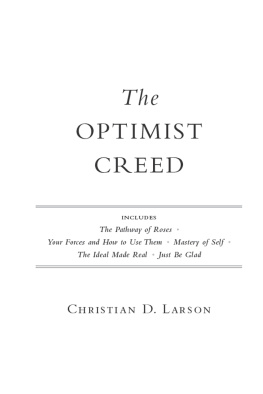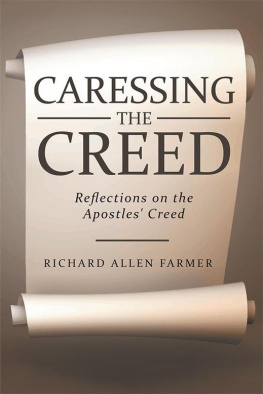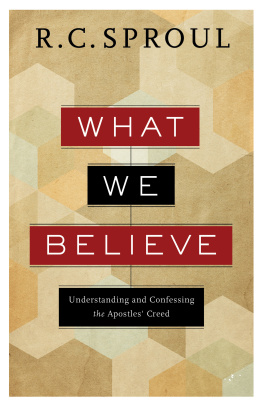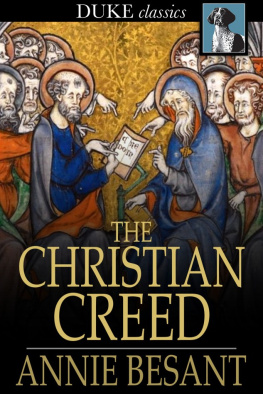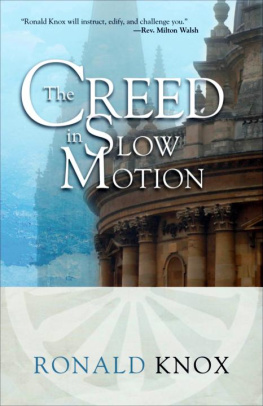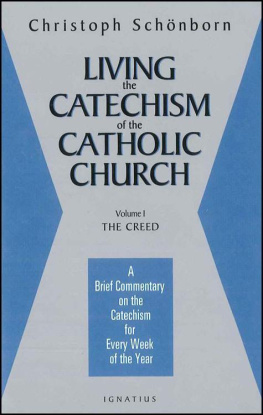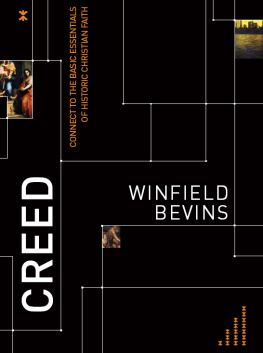Table of Contents
Preface
Like a lot of Roman Catholics my age (nearly sixty), I memorized the creed as a child and have recited itfirst in Latin, then in Englishevery Sunday at Mass. I have been slower to appreciate what it is and what it does.
As a young theologian in the heady days following the Second Vatican Council, I understood the historical role of the Rule of Faith as an instrument of self-definition in early Christianity, but I had little appreciation for the present-day role of the creed. Indeed, I shared the common preference for an existential understanding of faith as response to God over faith as belief in God.
More experience of life, broader reading, and a growing awareness of the deeply confused state of contemporary Christianity have led me to the writing of this book and to the rejection of my earlier prejudice.
I hold as strongly as ever that faith in God is an existential response of the whole person characterized by trust, obedience, and loyalty. But I now have come to appreciate how critical the role of belief is in structuring that response.
And I hold as strongly as ever that the church is the gathering of those committed by faith to such a radical response to God. But I have grown in my appreciation of how important it is for the church to have a communal sense of identity, and how hard that is to come by without something like a creed.
The creed is remarkable for its concise rendering of the Christian story and the structure of the Christian vision of reality. It is an instrument that can at once define the community of faith and challenge alternative stories and visions of reality.
I never thought I would say this, but I have come to think that the creed may be the essential instrument needed for the church to regain a sense of its own integrity and to recover a healthier reading of its Scripture. This book offers the thinking that has led to that conclusion.
My thanks to the members of St. Charles Borromeo Parish in Bloomington, Indiana, who patiently endured an early version of these thoughts some fifteen years ago, and to my fellow parishioners at Sacred Heart Church in Atlanta, who received a more recent version with generous attention. Their eagerness to learn what they were saying every Sunday, and our joint discovery of how little we appreciated what we were saying when we said it, encouraged the writing of this book, which goes far beyond my adult education classes but owes much to them. I am grateful as well for the intellectual stimulation (I should say challenge) offered by my brother, Patrick Johnson, to whom this book is dedicated in the full knowledge that he will not be convinced by anything in it. As always, I thank my friends Barry Jay Seltser and Steven Kraftchick and Mary Jo Weaver for companionship along the narrow and winding path of inquiring faith. I am particularly grateful to Andrew Corbin of Doubleday for his patience in seeing this project through, and for providing much-needed editing. Last of alland first of allmy thanks to Joy for all her years of love and support. She is the best of partners in faith.
Luke Timothy Johnson
December 29, 2002
Introduction
Many Christians know that deadly moment at a party when their friends realize they actually believe something everyone has merrily been belittling. They recall their stammered reassurances, their tortured reinterpretations, their relief when the conversation moves on, their self-contempt. They may never have heard of Nietzsche, may not be able to define Modernity, and may think of the Enlightenment as a chapter in a first-year college textbook. But their embarrassment at being seen as believers reveals them to be Christians whose view of the world has been shaped less by the Christian creed than by its cultured despisers.
At least since the middle of the nineteenth century, being part of the intelligentsia has meant despising creeds in general and Christianitys creed in particular. Nietzsche speaks for many when he distinguishes those who inquire from those who believe. Intelligence requires us to reason in a way diametrically opposed to the traditional one: wherever we find strength of faith too prominent, we are led to infer a lack of demonstrability, even something improbable, in the matter to be believed ( Genealogy of Morals 24).
For Modernity, belief in a creed is a sign of intellectual failure. Creeds involve faith, and faith makes statements about reality that cant be tested. Everyone knows that statements can be true only when they dont really say anything about the world or when they have been empirically tested. Creeds are therefore structures of fantasy. One cannot be both a believer and a critical thinker. Creeds also express convictions held by a group of people, and for intellectual elitists, the many is always a herd, and a herd will always believe what it is told. A creed negates the need for individuals to seek truth as a quest for authenticity. To be authentic, people must own each statement they make passionately and personally, and must accept nothing on the basis of outside authority. Better to stay silent than to speak a single word that is not a personal testimony.
For intellectuals in the West, it is the Christian creed that most offends. Nietzsche is again refreshingly direct: In the Christian world of ideas there is nothing that has the least contact with realityand it is in the instinctive hatred of reality that we have recognized the only motivating force at the root of Christianity ( The Antichrist 39). Christians are pitiable not only because they live by faith rather than by evidence, but because the faith they declare has so thoroughly been demolished by the evidence. This is the conviction lying behind all the raised eyebrows, averted glances, and embarrassed silences when the cultured cognoscenti find a committed Christian in their midst.
Isnt it obvious, these gestures suggest, that science has disproved each and every Christian claim? Adherence to them can be attributed only to an ineradicable (and probably insincere) social conservatism, invincible ignorance, or stupidityand we thought you were one of us! If the Christian creed has been shown to be false, and even its adherents know that it is false, their willing submission to its herd mentality must come from intellectual laziness or psychological weakness.
AN EMPTY PROJECT?
Anyone setting out, as I am, to provide a positive reading of the Christian creed needs to be aware how inane, literally empty, such a project must seem to those who consider themselves Christianitys cultured despisers. To them, my effort must seem at best an irrelevant entertainment. At worst it must seem a willful exercise in bad faith, a far-from-innocent manipulation of peoples hopes and fears by one who, by the very admission of knowing and appreciating alternative views, shows himself (they think) less than a true believer.
I could spend a great deal of time trying to justify my project in such eyes. I could suggest that faith in the face of doubt and uncertainty is as genuine as the skepticism the mind of Modernity approvesthat it is one expression of that personal and passionate quest for authenticity it values. I could point out that life in the world is not possible without some form of creed, and that even the hardest of physical sciences now admit that they cannot demonstrate their basic premises but must accept them on faith.
And I could offer that there are more ways of knowing reality than the simple one (Can it be empirically verified?) Modernity imposes, so that the truth of creeds can be tested by other criteria. But such arguments would not only consume the entire book, they would not have much effect, for cultured despisers are not likely to read this book and even less likely to be persuaded by an author who, after all, claims the Christian creed as his own.

